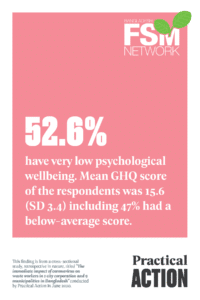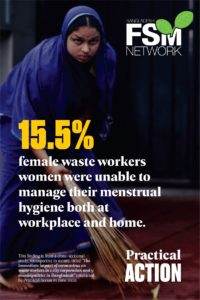The number of cases and deaths from covid-19 in Bangaldesh are continuing with fears that the disease continues to spread in this densely populated country. The lockdown measures have also had a shattering impact on the economy and livelihoods.

One particularly vulnerable group are waste workers living in low-income urban settlements. Their work is essential in keeping neighbourhoods clean and free from rubbish and overflowing toilets, but it also puts them at the frontline of risk. At the same time they rely on daily earnings, and without work, their income disappears.
The reality for these workers was revealed in a webinar held by the Bangladesh Faecal Sludge Management (FSM) network on ‘Covid-19 and waste and sanitation front-liners’. Four development agencies presented findings on different aspects of situation: Practical Action, SNV Netherlands Development Organization, WaterAid Bangladesh and Water & Sanitation for the Urban Poor (WSUP). Sanitation experts shed light on the most unheard voices and the needs of frontline waste and sanitation workers whose work does not end even during the pandemic.
Through these studies, the present living situation, impact of covid-19 on waste and sanitation workers including risks and vulnerabilities; current actual scenario of WASH in health care facilities and pit emptying businesses, and challenges and possible way forwards in city sanitation system were detailed.
Some of the biggest impacts were through a loss of work, fall in income, and soaring living cost. Impacts on mental health have been intensified as a result of the hardships faced. Access to water, sanitation, and hygiene in health care facilities still remain a challenge, as almost all of them lack improved toilets at their premises. Waste and sanitation workers in these facilities face particular risks, often with limited or no protection.
Research was carried out in ten urban centres including City corporations and Municipalities. Some of the stand-out findings included:
- The demand for pit-emptying has reduced drastically up to 80% in the last two months. Customers were more likely to resort to cheaper but unsafe solutions.
- Nearly half (48%) of waste workers’ incomes have reduced while 71% have had to spend more to cover their basic needs.
- Average household income reduced around 41% per month and one member of every three households became unemployed. As a coping strategy 70% of waste workers reduced their expenditure and 53% borrowed money from others.
- A third of workers said they had reduced household meals, now eating only twice a day, as a coping strategy.
- 47% have very low psychological wellbeing e.g. around 81% have a poor psychological condition, namely social dysfunction (93%), anxiety and depression (68%), and loss of confidence (20%).
At the same time, workers remain at the frontline of risk

- 39% of workers do not have access to handwashing facilities at work. Surprisingly, 23% of medical cleaners do not wash hands after helping a patient, which poses both personal and public infection risk.
- 97% of general waste workers use safety gear during their work, but around 48% of them do not feel comfortable using such materials. 37% of workers do not get supplies of safety gear as frequently as required, so on average, each worker personally spent $4 on safety gear during the first 60 days of the pandemic.
- Almost half of the waste workers (48%) and their family members (42%) experienced COVID-19 symptoms. 37% of workers lack knowledge about where or how to access treatment if they get symptoms or test positive.
The scenario for women is the hardest. 42% of female waste workers faced some sort of violence at home: including verbal abuse (35%), increased unpaid burden of care work (21%), physical abuse (5%), and sexual abuse (2%). 18% of women faced increased difficulties maintaining hygiene at home, and 16% faced increased difficulties managing their menstrual hygiene.
The findings of these studies highlight the diverse ways in which covid-19 is having a devastating affect on waste and sanitation workers, at home and as they serve their neighbourhoods and health facilities. The findings of these studies highlights areas for action by municipalities and managers of healthcare facilities.
Considering the hazardous reality and the huge risks present in this sector, experts’ are caling for an urgent plan of action with appropriate resources allocation to protect the health and livelihoods of these essential waste and sanitation workers. Development organizations need to find ways to respond to this immediate emergency, and to the long-term impacts of the crisis as we seek to rebuild towards a ‘new normal’ that offers greater recognition, respect and protection to these workers at the frontline of service provision during the pandemic and beyond.
A full recording of the webinar can be found on the Bangladesh FSM Network facebook page.